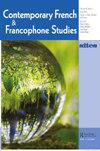当代路易斯安那法语文学中的食谱、诗歌和记忆
IF 0.2
4区 文学
0 LITERATURE, ROMANCE
引用次数: 0
摘要
路易斯安纳州的法国文学,就像它的美食一样,是流动的、多元的、永远在发展的。语言和食物是路易斯安那人表达身份、情感、记忆和文化的两种重要媒介。尽管路易斯安那州的法语在20世纪中期由于美国化而几乎被抹去,但文化表达和演变在口头文学和烹饪的交汇处蓬勃发展。食物作为一个主题、词汇领域和符号,帮助当代厨师和作家定义自己的身份。在创造性写作的回顾中,食物在其贡献者寻求身份的过程中起着至关重要的作用。路易斯安那文化的克里奥尔化体现在创造性的表达中,无论是梅丽莎·马丁(Melissa Martin)的《蚊子晚餐俱乐部》(Mosquito Supper Club, 2020)中的一道菜,还是《福福歌》(Feux Follets)中的一首诗。这篇文章展示了象征性的食物和创意写作的交集如何为文学身份的演变提供了一个空间,这个空间就像路易斯安那州的美食和文化一样充满活力和克里奥尔化。尽管身份的流动性和多元性,烹饪书和诗歌的作者将路易斯安那美食作为一种隐喻、形象和文化对象来写作,以扩大21世纪法国文学的声音。“因为轻微的北风意味着我们肯定会收到邻居的邀请,请我们喝秋葵汤。在铸铁锅里烤面糊的香味,很快我们就会找到热秋葵汤,赶走身体里的寒冷——那香味乘着小小的北风传到每个村庄。2在本文中,“土著”一词用于描述路易斯安那州联邦承认的四个土著部落中的一个或其组合:奇蒂玛查部落、库沙塔部落、乔克托印第安人的耶拿部落和突尼卡-比洛克西部落,以及截至2021年,其国家承认的部落。路易斯安那州的阿代卡多印第安人、BCCM的Bayou Lafourche部落(马斯科吉的比洛西-奇蒂玛查联盟)、伊巴尔的乔克托-阿帕奇部落、路易斯安那的克利夫顿乔克托部落、四风切罗基联盟、BCCM的大卡尤/杜拉克部落、BCCM的让·查尔斯岛部落、路易斯安那的乔克托部落、路易斯安那的纳奇托奇部落、奇安角部落、我想那股气味一定传播了一些,因为我们突然被一群陌生人包围了,他们问我们:“那是什么?”“秋葵汤是什么?”“就像汤一样?”这是在大力水手和埃默里·拉加斯、卡津鸡和卡津薯条等等之前。妈妈回答说:“嗯……是的。”就像汤一样。”她给了他们一些装在小杯子里的,他们说很好,很好。但我不认为他们知道它有多好。你知道,我不太记得我的童年,我的记忆力一直不好,但我记得那个秋葵汤,因为外面很冷,你总是在外面冷的时候想吃秋葵汤现在你把海鲜加进去,这些生物排成一排等待着fais-do-do,太阳和微风帮助我们入睡,眼泪,灵魂,和米饭一起上菜,就好了。让我们吃吧如果我继续走下去,我会发现什么?似乎每个气候寒冷的地方都有全民医疗保健、产假和文化投资,他们真的知道如何在那里吃饭。但是他们没有好的运气。schase Cormier于2023年5月在路易斯安那大学拉斐特分校获得法语研究博士学位。他是《Feux Follets》的编辑,这是一本由UL Lafayette主持的关于创意表达的评论。他研究路易斯安那州和阿卡迪亚的法国文学和美食。他也是一位诗歌作家,作品发表在《副歌》、《画册》和《西南评论》上。蔡斯目前是威廉姆斯学院的客座助理教授。本文章由计算机程序翻译,如有差异,请以英文原文为准。
Recipes, Poems, and Memory in Contemporary Louisiana Francophone Literature
AbstractLouisiana French literature, like its cuisine, is fluid, plural, and forever evolving. Language and food are two vital mediums through which Louisianans express identity, emotions, memory, and culture. Even as Louisiana’s French language faced a near erasure in the mid-twentieth century due to Americanization, cultural expression and evolution thrive at the intersection of oral literature and cuisine. Food, as a theme, lexical field, and symbol helps contemporary cooks and writers define their own identity. In the review of creative writing, Feux Follets (1991–Present), food plays a vital role in the quest for identity among its contributors. The creolization of Louisiana culture manifests itself in creative expression, be it a dish in Melissa Martin’s Mosquito Supper Club (2020), or a poem in Feux Follets. This article demonstrates how the intersection of emblematic food items and creative writing provides a space for the evolution of a literary identity that is as vibrant and creolized as Louisiana cuisine and culture in general. Despite the fluidity and plurality of identities, writers of cookbooks and poetry write Louisiana cuisine as a metaphor, image, and cultural object to amplify Franco-literary voices in the twenty-first century.Keywords: RecipespoetryLouisianacookbooksCajunmemory Notes1 “Because little north winds mean that we will surely be receiving an invitation from a neighbor for some gumbo. The delicious smell of roux browning in cast-iron pots, where soon we will find hot gumbo and chase the cold from our bodies—that delicious smell spreads to each village riding the little north winds.”2 Throughout this paper, the term Indigenous is used to describe one or a combination of Louisiana’s four federally recognized aboriginal tribes: The Chitimacha Tribe, the Coushatta Tribe, the Jena Band of Choctaw Indians and the Tunica-Biloxi Tribe and, as of 2021, its state-recognized tribes: the Adai Caddo Indians of Louisiana, the Bayou Lafourche band of BCCM (Biloxi-Chitimacha Confederation of Muskogee), Choctaw-Apache Tribe of Ebarb, Clifton Choctaw Tribe of Louisiana, Four Winds Cherokee Confederacy, Grand Caillou/Dulac Band of BCCM, Isle de Jean Charles Band of BCCM, Louisiana Band of Choctaw, Natchitoches Tribe of Louisiana, Pointe-Au-Chien Tribe, and the United Houma Nation.3 And I think that the smell must have travelled a bitBecause—all of a sudden—we were surrounded by a bunch of strangersThey asked us“What is that?”“What is ‘gumbo’?”“It’s like a soup?”This was before Popeye’s and Emeril LagasseAnd Cajun chicken and Cajun fries and allMom responded: “Euh… yes. It’s like a soup.”And she gave them some in little cupsAnd they said that it’s good, quite good.But I don’t think that they knew just how good it was.You know, I don’t remember much from my childhoodMy memory was never goodBut I remember that gumboBecause it was cold outAnd you always want gumbo when it’s cold out.4 Now you add the seafood:…the creatures form a line for the fais-do-do…the sun and breeze to help us sleep…the tears…the soulsServe with rice and it’s ready.Let us eat.5 If I kept going, what would I find?It seems that every place with a cold climate hashealth care for alland maternity leaveand cultural investmentsThey really know how to eat up there.But they don’t have good boudin.Additional informationNotes on contributorsChase CormierChase Cormier obtained a Ph.D. in Francophone Studies from the University of Louisiana at Lafayette in May 2023. He is the editor of Feux Follets, a review of creative expression hosted by UL Lafayette. He works on Louisiana and Acadian French literature and foodways. He is also a writer of poetry with works published in Feux Follets, Ancrages, and The Southwestern Review. Chase is currently a Visiting Assistant Professor at Williams College.
求助全文
通过发布文献求助,成功后即可免费获取论文全文。
去求助
来源期刊

Contemporary French and Francophone Studies
LITERATURE, ROMANCE-
CiteScore
0.30
自引率
0.00%
发文量
43
期刊介绍:
An established journal of reference inviting all critical approaches on the latest debates and issues in the field, Contemporary French & Francophone Studies (formerly known as SITES) provides a forum not only for academics, but for novelists, poets, artists, journalists, and filmmakers as well. In addition to its focus on French and Francophone studies, one of the journal"s primary objectives is to reflect the interdisciplinary direction taken by the field and by the humanities and the arts in general. CF&FS is published five times per year, with four issues devoted to particular themes, and a fifth issue, “The Open Issue” welcoming non-thematic contributions.
 求助内容:
求助内容: 应助结果提醒方式:
应助结果提醒方式:


